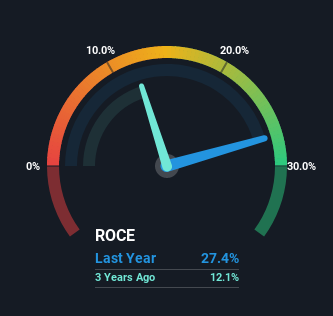- United Kingdom
- /
- Specialty Stores
- /
- LSE:PROC
ProCook Group (LON:PROC) Is Investing Its Capital With Increasing Efficiency
What trends should we look for it we want to identify stocks that can multiply in value over the long term? Amongst other things, we'll want to see two things; firstly, a growing return on capital employed (ROCE) and secondly, an expansion in the company's amount of capital employed. Put simply, these types of businesses are compounding machines, meaning they are continually reinvesting their earnings at ever-higher rates of return. Speaking of which, we noticed some great changes in ProCook Group's (LON:PROC) returns on capital, so let's have a look.
Understanding Return On Capital Employed (ROCE)
Just to clarify if you're unsure, ROCE is a metric for evaluating how much pre-tax income (in percentage terms) a company earns on the capital invested in its business. Analysts use this formula to calculate it for ProCook Group:
Return on Capital Employed = Earnings Before Interest and Tax (EBIT) ÷ (Total Assets - Current Liabilities)
0.27 = UK£9.4m ÷ (UK£51m - UK£17m) (Based on the trailing twelve months to April 2022).
Therefore, ProCook Group has an ROCE of 27%. That's a fantastic return and not only that, it outpaces the average of 13% earned by companies in a similar industry.
Check out the opportunities and risks within the GB Specialty Retail industry.

Above you can see how the current ROCE for ProCook Group compares to its prior returns on capital, but there's only so much you can tell from the past. If you'd like, you can check out the forecasts from the analysts covering ProCook Group here for free.
What The Trend Of ROCE Can Tell Us
We like the trends that we're seeing from ProCook Group. The numbers show that in the last five years, the returns generated on capital employed have grown considerably to 27%. The amount of capital employed has increased too, by 440%. This can indicate that there's plenty of opportunities to invest capital internally and at ever higher rates, a combination that's common among multi-baggers.
Our Take On ProCook Group's ROCE
In summary, it's great to see that ProCook Group can compound returns by consistently reinvesting capital at increasing rates of return, because these are some of the key ingredients of those highly sought after multi-baggers. And since the stock has dived 80% over the last year, there may be other factors affecting the company's prospects. In any case, we believe the economic trends of this company are positive and looking into the stock further could prove rewarding.
ProCook Group does come with some risks though, we found 2 warning signs in our investment analysis, and 1 of those is a bit unpleasant...
If you want to search for more stocks that have been earning high returns, check out this free list of stocks with solid balance sheets that are also earning high returns on equity.
New: Manage All Your Stock Portfolios in One Place
We've created the ultimate portfolio companion for stock investors, and it's free.
• Connect an unlimited number of Portfolios and see your total in one currency
• Be alerted to new Warning Signs or Risks via email or mobile
• Track the Fair Value of your stocks
Have feedback on this article? Concerned about the content? Get in touch with us directly. Alternatively, email editorial-team (at) simplywallst.com.
This article by Simply Wall St is general in nature. We provide commentary based on historical data and analyst forecasts only using an unbiased methodology and our articles are not intended to be financial advice. It does not constitute a recommendation to buy or sell any stock, and does not take account of your objectives, or your financial situation. We aim to bring you long-term focused analysis driven by fundamental data. Note that our analysis may not factor in the latest price-sensitive company announcements or qualitative material. Simply Wall St has no position in any stocks mentioned.
About LSE:PROC
ProCook Group
Through its subsidiaries, engages in the sale of kitchenware and related products in the United Kingdom.
Reasonable growth potential with proven track record.
Similar Companies
Market Insights
Community Narratives



